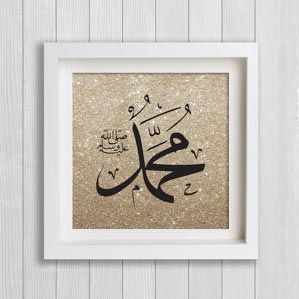
The Prophet s used to talk to his companions, joke with them, and listen to their needs.
The Prophet s used to talk to his companions, joke with them, and listen to their needs. He would correct any errors he saw them doing, especially when they were racial mistakes. Abu Hurairah said:
“Two people swore at each other once, and one of them insulted the other by ridiculing his mother. This reached the Prophet s, and he called the man and said: ‘Did you scoff at his mother?’ and he kept repeating it. The man said, ‘O Messenger of Allah y, ask Allah y to forgive me.’ He said to him: ‘Raise your head and look about, you are not better than any individual regardless whether he is of a red or black skin color. No one is better than the other except through piety.’” (Ibn Rahawaih)
The Prophet s would not stand for another to make fun of anyone else in his presence. Once, while his Companions got together in a gathering and the Prophet s had yet to come, Khalid B. Al-Walid, Abdurrahmann B. Auf, Bilal B. Abi Rabah, and Abu Dharr were among those in attendance. The only dark skinned companion present was Bilal the Abyssinian. Abu Dharr began speaking, and Bilal corrected him. Abu Dharr exclaimed out of anger, “Even you, O son of a black woman, try to correct me?”
Bilal got up, visibly upset at what was said, and said: “By Allah y, I will report you to the Prophet.” He went to him and informed him of what was said and the Prophet s became very angry.
Abu Dharr rushed to meet the Prophet s and said “Peace be upon you, O Prophet of Allah y.” He continued, “I am not sure if he responded to my greeting due to his extreme anger.” Then he said: “O Abu Dharr! Have you ridiculed him on account of his mother? Indeed you are a man in whom there remain traits of the pre-Islamic era!” Abu Dharr wept and said: “O Messenger of Allah y, ask Allah y to forgive me.” He left the Masjid weeping and when he saw Bilal, he put his head on the ground and said to Bilal, “O Bilal, I will not move from my position till you put your foot on my head. You are the honorable and I am the disgraced.” Bilal wept, and kissed the cheek of Abu Dharr and said: “A face that has prostrated to Allah y is not to be stepped on—rather, it is to be kissed.” (Bukhari)
Bilal was a great man. The Prophet s said to him: “Tell me of the best deed you did after embracing Islam, for I heard your footsteps in front of me in Paradise.”
Bilal replied, “I did not do anything exceptional except that whenever I performed ablution during the day or night, I prayed after that ablution as much as was written for me.” (Bukhari)
The Prophet s revered these individuals so much that he would frequently sit with them. One day, while Bilal, Suhaib, and Ammar were sitting with the Prophet s, an emissary from Quraish came, and upon seeing these Companions with him, they said: “We want you to give us a time whereby we can sit with you. We want the Arabs to know our status and honor and the delegations come to you, but we are embarrassed that people see us with you while these poor individuals sit with you.” The Prophet s said, “All right,” and he called Ali to write down something to this effect. But before anything happened, the command of Allah y came down:
“And do not send away those who call upon their Lord morning and afternoon, seeking His countenance. Not upon you is anything of their account and not upon them is anything of your account.(No one is held accountable for the deeds or intentions of another. That is left to Allah ’sy judgment) So were you to send them away, you would [then] be of the wrongdoers. And thus We have tried some of them through others that they [i.e., the disbelievers] might say,
‘Is it these whom Allah y has favored among us?’
Is not Allah y most knowing of those who are grateful?
And when those come to you who believe in Our verses, say, ‘Peace be upon you.’ Your Lord has decreed upon Himself mercy - that any of you who does wrong out of ignorance, repents after that, and then corrects himself - indeed, He is Forgiving and Merciful.” (6:52)
The Prophet s tossed aside the letter he was about to have written for them and said: “Peace be upon you. Your Lord has decreed upon Himself mercy.” (Ibn Majah)
